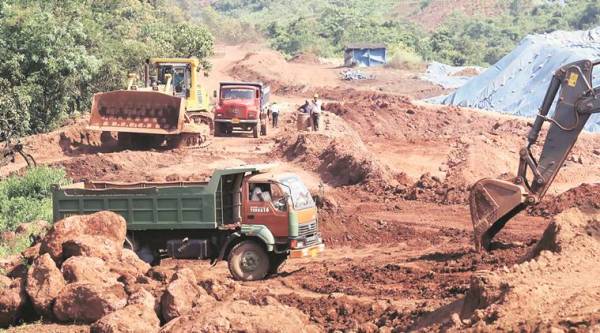| New Delhi |
Published:September 20, 2017 2:33 am
 As per the data shared by the mines ministry, of a total land area of 32.8 lakh square km, the country has 5,70,000 square km of obvious geological potential (OGP). (Representational image)
As per the data shared by the mines ministry, of a total land area of 32.8 lakh square km, the country has 5,70,000 square km of obvious geological potential (OGP). (Representational image)
With the Central government starting the process to revamp the National Mineral Policy (NMP), 2008, the Niti Aayog has told the Union mines ministry that in order to boost mineral exploration, companies need to be given the “right of first refusal” over the mining area that is being explored.
Currently, if a company has got an area’s non-exclusive reconnaissance permit (NERP), which is required for preliminary exploration, it can either keep the resultant data with itself or submit it to the respective state government so that the latter can initiate the auction of mining licence (ML) or composite licence (prospecting licence-cum-ML). The company that has got an area’s NERP and the resultant data cannot make a direct claim for ML or composite licence, according to the Mines and Minerals (Development and Regulation) Amendment Act, 2015.
On August 28, 2017, V S Gaur, joint secretary, Niti Aayog, participated in the first meeting of the committee that has been constituted to review the NMP 2008. According to the minutes of the meeting: “The NMP 2008, he (Gaur) said, though being very good, failed to work the results as there was a mismatch between the policy and the statute… For encouraging exploration, he stressed the need to strengthen the state government departments and buttress the efforts of the private sector in exploration by giving them the ‘right of first refusal’.”
Gaur said while earlier the law assured “seamless transition from reconnaissance to prospecting and then to mining, not much of investment came and there was hardly any big level of exploration”. He added that the present statute — the new mining law passed in 2015 — has slowed “down the activity even further” as it “does not assure seamless transition from reconnaissance to prospecting policy” and this is “actually a dampener on exploration”.
Under the 2015 mining law, the Central government established the National Mineral Exploration Trust (NMET) and notified its rules on August 14, 2015. The NMET is a non-profit body run by the Central government with the primary objective of promoting regional and detailed mineral exploration in the country. The holder of a mining lease or a composite licence shall pay to the NMET a sum equivalent to two per cent of the annual royalty paid to the respective state government.
“He (Gaur) said the challenge before us is how to really go ahead for taking up exploration in a big way; and said that no mineral-rich county has taken up exploration through government’s funding. In the coming decades, he said, the sector will witness a shift in focus from bulk minerals to non-bulk minerals; and that we should really focus on rare earth minerals and take the present opportunity to encourage private sector participation in exploration and development of rare earth minerals which are strategically and economically valuable for the country,” the minutes stated.
As per the data shared by the mines ministry, of a total land area of 32.8 lakh square km, the country has 5,70,000 square km of obvious geological potential (OGP). As of 2012, as per the ministry, only 5,046 sq km was under mineral lease, less than 1 per cent of the OGP. Most exploration activities in the country are of the conventional type with restricted input from geochemistry, geophysics and remote sensing. The finds so far are located near the surface, mostly up to a vertical depth of 100 m.
Along with the NITI Aayog, various other stakeholders including Geological Survey of India (GSI), Union steel, finance, railway, shipping, roads, coal ministries, various industry groups and state governments participated at the August 28 meeting. Steel major JSW also participated in the meeting. Most of the stakeholders at this meeting advised the mines ministry to incentivise exploration.
For all the latest India News, download Indian Express App